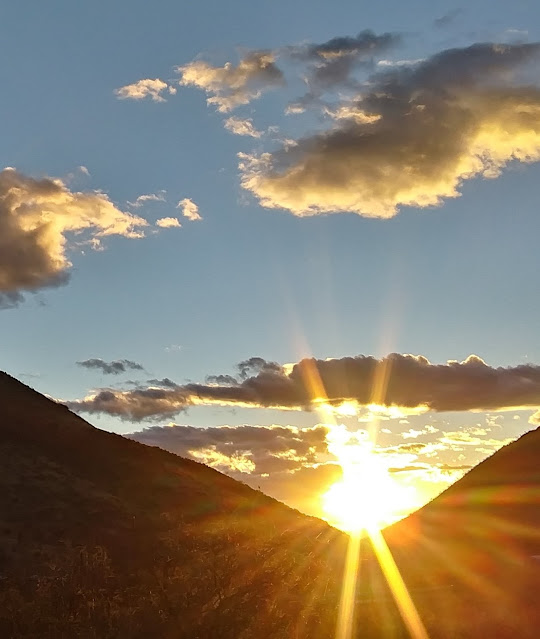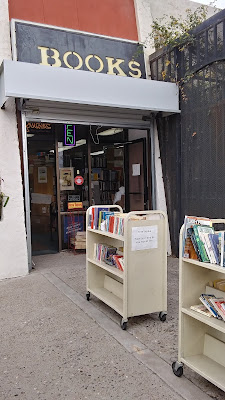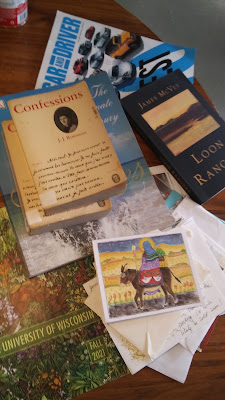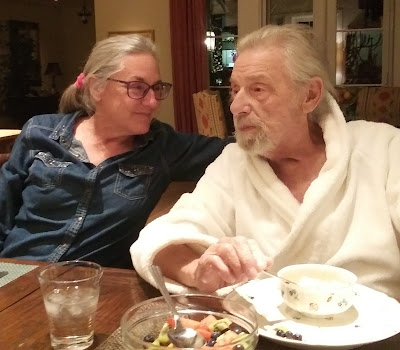My title today comes to you from a voice in my head whispering, “Cloudy with a chance of meatballs,” the title of one of my nephews’ favorite books when they were little, as well as from a couple of conversations with locals, two of whom, separately, told me that winter is their favorite season. Is it yours? Why or why not? One winter aficionado said he loves it because it’s “more like the way life used to be here.” (That must have been back in the days of the “old school,” when Northporters didn’t run to Traverse City every week to do their shopping--and then complain loudly and bitterly about traffic and crowds.) I’ll have to ask the other friend why she ranks winter #1 season of the year.
 |
| Winter is beautiful. |
Winter is quiet and cozy. I have to give it that. Coming into a warm house, stomping snow off boots and pulling off jacket and cap and mittens to enjoy a hot cup of cocoa … reading by lamplight in a big chair … gazing into a cheery, flickering fire or out the window at falling snow … going to sleep under mounds of blankets and comforters--all of that is richly cozy, and the colder the wind and the deeper the snow, the cozier one’s snuggly home comforts.
 |
| Kneaded dough |
 |
| Rising dough |
On a snow day, too, nothing is more satisfying than kneading bread dough, although making soup is a good snow day project, too. Anything that adds warmth and mouthwatering aromas to counteract the lack of sunshine! Onion soup or a stew made from scratch (here is a yummy cauliflower soup) is good, but sometimes shortcuts work out well, too. One recent evening I had leftover shrimp fried rice and added it to a can of Progressive tomato soup, throwing in a generous handful of okra and drizzling with hot sauce at serving time, and that made a very satisfying supper.
 |
| Shortcut |
You’ll also want to wash out and save the Progresso soup can for making English muffins. It’s just the right size.
Desk work can be enjoyable while it’s snowing and blowing outdoors, especially if the “work” is writing letters to friends. You don’t even have to sit at a desk. A cozy reading chair with a big book for a lap desk works equally well, and you’ll want a cup of tea or cocoa nearby as you write, chatting on paper and picturing your friend’s pleasure when she receives your news in the mail. More and more of our visits, I’m thinking, will be this kind as we grow older….
It goes saying (but why would I deny myself the pleasure of saying it?) that reading is a most delicious winter pleasure. Grass doesn’t need mowing, and gardens don’t need weeding, so after you’ve shoveled snow and exercised the dog, maybe done a bit of laundry, who can blame you for sitting down with a book? And if you’re like me, you’ll want several throughout the house. You need something to page through idly, perusing and skimming while tea water is heating. Cookbooks or art books, even a volume of cartoons work for those times. For me, the loveliest of my casual browsing books is one I'm keeping these days on my dining table: a book of the history and geology and agriculture of the canton of Blesle, in France’s Alagnon valley in the old Auvergne province. It was in the medieval village of Blesle that the Artist and I spent one magical evening, night, and morning. Everything about the place made such an impression on me that I find it hard to believe our time there was so brief.
 |
| Just right of center is the old fountain, across the street from La Bougnate, where we stayed. |
I usually have at least one serious nonfictionbook going, and right now that is John Kenneth Galbraith’s The Age of Uncertainty. Wow! Talk about a writer who can make economic history come alive! Such a witty and pithy maker of sentences, a clear distiller of thought! Still, economic history isn’t something to read straight through cover to cover, at least for me, so although the book is generously illustrated as well as entertainingly written, I take it in small doses.
For bedtime, I tend to choose novels or memoirs, because I almost invariably fall asleep and then wake up at 3 a.m. to read a bit more before my second sleep, and if I attempt something serious or, worse yet, something horrifying (think political!), how will I ever get (or get back) to sleep? Margaret Hard’s A Memory of Vermont filled the bedtime bill for two or three nights, followed by Miss Buncle’s Book, a humorous novel by D.E. Stevenson about a woman who wrote a novel about people in her little village and then found almost everyone in the village up in arms over the way they had been portrayed. Before those, Albert Murray’s four autobiographical novels carried me through many dark evenings, and after them Moberg’s Unto a Good Land lasted three nights. The bedtime book doesn’t have to be fluff, though a little fluff now and then never hurt anyone.
Having enjoyed The Book Charmer, by Karen Hawkins, a while back, I yielded to the temptation of its sequel, A Cup of Silver Linings, another tale set in the little town of Dove Pond. I wouldn’t call it fluff. I’m also hesitant to classify the series as chick lit, though it has some of the earmarks. And despite lurking love interest, the books are certainly not rom-com. Each story presents men, women, and young people in the Dove Pond stories, but the most important relationships – at least, those in the foreground – are between sisters or mothers and daughters or friends. There are secrets that cause problems, but there are also problems that aren’t so secret and can’t be eliminated but have to be faced. Not heavy but not fluff. Interesting without being obsessing. Perfect for winter bedtime.
Problems that can’t be eliminated but have to be faced, I just wrote. That is the other side of winter: the challenges. Like cold. Like higher bills. Expenses go up, income goes down: that is one big challenge of winter in a nutshell. Heating is expensive, as is snowplowing. But walking and driving can be hazardous, too, without summer’s firm footing or clear roadways.
Then there are the holidays, which present their own challenges. The Artist and I had long ago stopped traveling for Thanksgiving and Christmas holidays, weather and traffic being productive of stress, at best, and completely out of our control. Our last Christmas together, in Dos Cabezas in 2021, he pronounced “the most relaxed” he had ever had, when after a big breakfast and opening a few presents, we lay around snacking and napping and watching movies and petting the blissed-out dog until dinner time, enjoying the quiet, peaceful lack of fuss.
What is “lack of fuss” with a soulmate, however, is different with just a dog. --You should excuse the phrase “just a dog,” please! Sunny Juliet is a great comfort but not a conversationalist or even much of a cuddler! Oh, and she needs and wants to go out and play in the snow, too!
Do I want to go out and play in the snow? When the temperature is hovering in the ’teens and the wind is more than nipping at my nose--biting my face, rather? It doesn’t matter. We must go out!
Out! What if the power goes out? It has happened before, but the Artist was here with me. Still, I am as prepared as I can be. With propane, I can use my stove and gas fireplace; I have candles and oil lamps; a couple of stock pots are filled with water for emergency use; and I have charged up the little portable phone charger my sister gave me last year. I’m also well stocked with dog food and paper products--life’s essentials!
So that’s what I think of winter—cozy with challenges—and I can’t call it my favorite season. In the old days, with the Artist, I might have named autumn my #1, since we traditionally took a little vacation every September, but now I’ll probably go with spring, the season of promise, of new growth, of lengthening days, long days not yet bringing the hectic pace of summer.
 |
| Spring will come again, I remind myself. |
And yet, truth be told, there’s no telling when a nearly perfect day will drop down on you. An unexpected encounter or an errand unexpectedly turning into a delightfully surprising and wonderful time, the making of a new friend while visiting old friends. It happened to me last Tuesday, and it can happen in any season of the year. There is no foretelling life’s gifts.
An old friend told me a few days ago that he often quotes me. “What on earth--? You quote me?” “You said,” he reminded me, “that what bothered you most about the thought of dying was that you wouldn’t know how things turned out.” True. I did say that. Delights and torments, adventures and schemes, will continue, but I’ll have to leave the party while it’s still going on.
All the more reason, while still here, to get out of bed every day, even in winter, and bundle up and get out there! As the Artist and I said to each other so many mornings, throughout so many years, as we wondered what a day might bring, you never know!
 |
| Sunny Juliet is always ready! |
 |
| I'm glad to be there for that! |


































